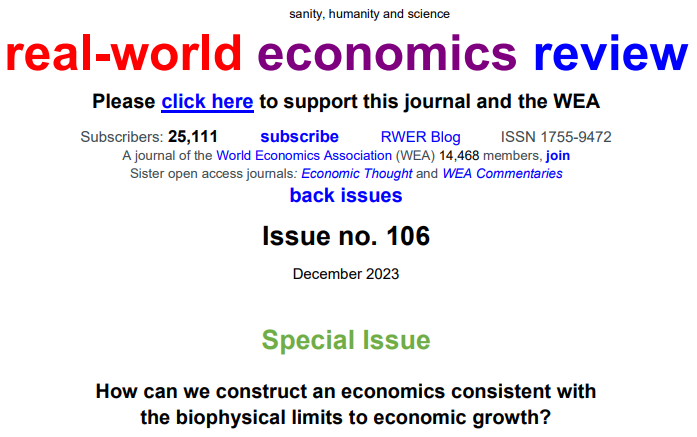In this Special Issue from the Real-World Economics Review, the editors suggest reflecting on the question: How can we build an economy compatible with biophysical limits to economic growth? They argue that a reinvention of basic economic concepts and relationships is needed to address the climate crisis.
Part One: Partial Answers to the Question
Provides diverse perspectives on constructing an economy consistent with the biophysical limits to economic growth. Importantly, the section presents various approaches to aligning economic theory and practice with the planet’s biophysical constraints. For instance, an article argues that ecological economics, which offers an understanding of the economy-environment relationship, can help us move beyond the limitations of neoclassical economics.
Similarly, one article proposes an economic theory grounded in thermodynamic laws and ecological principles, allowing for a better understanding of economic growth limits. Besides, another article points out that a sustainable economy requires the interdependent maintenance and enhancement of six types of capital: natural, human, social, built, financial, and institutional.
It explores “oikonomics,” emphasizing household management and living within ecological limits as a framework for a sustainable, equitable economic system. Concurrently, in this Special Issue from the Real-World Economics Review, other articles argue for reorienting economics towards social-ecological provisioning, which requires a change in economic thinking and practice.
Finally, several articles propose an economics of deep transformations that emphasizes radical economic systems and structure changes. Likewise, another contribution explores the potential for economics to become more ecological, necessitating a fundamental shift in economic thinking, practice, and recognition of ecological limits. Concludes with the consensus that a sustainable and just economic system requires a fundamental shift in economic thinking and practice and an understanding of the economy-environment interdependence.
Part One Article Index
- Economics as if ecology mattered by Peter Newell
- An economic theory compatible with life processes and physical laws by James K. Galbraith
- Supporting well-being over time: Six kinds of capital required in a healthy economy by Neva Goodwin
- Oikonomics and the limits to growth by Andri Werner Stahel
- Reorienting economics to social ecological provisioning by Clive L. Spash and Clíodhna Ryan
- An economics of deep transformations by Hubert Buch-Hansen, Iana Nesterova, and Max Koch
- Will Economics Ever Become More…Ecological? by Richard Parker
- Towards a relational economics by Tony Lawson
- Putting energy back into economics by Steve Keen
- Against the clock: Economics 101 and the concept of time by Jamie Morgan
- The adoption of ‘complexity’ in economics as a contribution to resolving dilemmas in the Anthropocene by Maria Alejandra Madi
- Biophysical limit and metabolic growth: New understanding of modern division of labor and sustainable economies by Ping Chen (pen name: Meishan)
- Complex economies embedded in the biosphere with the commons restored by Geoff Davies
- Sharing planet Earth: Overcoming speciesism in economics by Carsten Herrmann-Pillath
Part Two: Background Considerations
The Special Issue from the Real-World Economics Review delivers contextual insights for creating an economy that aligns with the biophysical limits to economic growth. It offers theoretical frameworks, historical perspectives, and methodological considerations, comprising contributions from various authors, each providing a unique perspective.
For instance, one key discussion in this section is the often-overlooked concept of time in economics. Thus, it asserts that traditional economic models often neglect this aspect, and a more nuanced understanding of time is crucial for developing ecological economics. Proposes a more process-oriented approach to economics by criticizing the assumption of linear time and the predictability and controllability of economic processes in traditional models. This approach considers ecological constraints such as climate change and resource depletion.
Moreover, another significant topic that unfolds is the role of consciousness in economics. Criticizes traditional economic models for overlooking consciousness in shaping economic behaviors. Also, it argues for a more holistic and interdisciplinary approach to economics that can capture the complex relationships between consciousness, economic behavior, and ecological constraints. Other articles in this section delve into the history of economic thought, the role of institutions in shaping economic behavior, and the importance of interdisciplinary approaches to understanding complex economic systems. One article emphasizes the importance of understanding the historical context of economic thought for developing an economy consistent with ecological limits. Meanwhile, another article highlights the significant role of institutions in shaping economic behavior and underscores the necessity of a nuanced understanding of institutional dynamics.
Part Two Article Index
- On the Capitalogenic Climate Crisis: Rethinking Man, Nature, and the Anthropocene, and Why It Matters for Planetary Justice by Jason W. Moore
- Unlimited Limits and the Challenges of Living in Reciprocity with Nature by Richard Norgaard
- Positivism and the Plight of the Planet by Asad Zaman
- Economics Needs to Ditch Most of What It Does and Adopt a Realist Global Political Economy and Futures Approach by Heikki Patomäki
- Economics of Abundance with Degrowth by Susan Paulson
- Who Gets What, How, and Why? The System of Provision Approach by Kate Bayliss and Ben Fine
- Liveability Within Planetary Limits by Luca Calafati and Karel Williams
- Demographics, the Economy, and the Environment: An MMT Approach by Randall Wray and Yeva Nersisyan
- On Ecology and Economics by Victor Beker



